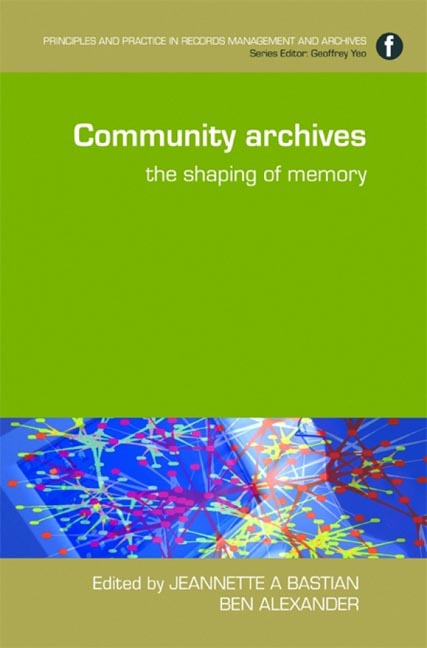Book contents
- Frontmatter
- Contents
- Introduction to the series
- Acknowledgements
- Contributors
- Introduction: Communities and archives – a symbiotic relationship
- Part 1 A community archives model
- Part 2 Communities and non-traditional record keeping
- Part 3 Records loss, destruction and recovery
- 6 Archiving the queer and queering the archives: a case study of the Canadian Lesbian and Gay Archives (CLGA)
- 7 A living archive, shared by communities of records
- 8 Truth commissions and the construction of collective memory: the Chile experience
- Part 4 Online communities: how technology brings communities and their records together
- Part 5 Building a community archive
- Conclusion: The archivist and community
- Bibliography
- Index
- Miscellaneous Endmatter
- Miscellaneous Endmatter
- Miscellaneous Endmatter
6 - Archiving the queer and queering the archives: a case study of the Canadian Lesbian and Gay Archives (CLGA)
from Part 3 - Records loss, destruction and recovery
Published online by Cambridge University Press: 08 June 2018
- Frontmatter
- Contents
- Introduction to the series
- Acknowledgements
- Contributors
- Introduction: Communities and archives – a symbiotic relationship
- Part 1 A community archives model
- Part 2 Communities and non-traditional record keeping
- Part 3 Records loss, destruction and recovery
- 6 Archiving the queer and queering the archives: a case study of the Canadian Lesbian and Gay Archives (CLGA)
- 7 A living archive, shared by communities of records
- 8 Truth commissions and the construction of collective memory: the Chile experience
- Part 4 Online communities: how technology brings communities and their records together
- Part 5 Building a community archive
- Conclusion: The archivist and community
- Bibliography
- Index
- Miscellaneous Endmatter
- Miscellaneous Endmatter
- Miscellaneous Endmatter
Summary
As a young teenager I looked desperately for things to read that might excite me or assure me I wasn't the only one, that might confirm an identity I was unhappily piecing together.
Edmund White, Out of the Closet, on the Bookshelf (Kester, 1997, 121)
Introduction
In 1987 Canadian sociologist Gary Kinsman published a landmark study titled The Regulation of Desire – Sexuality in Canada. It is widely considered to be the first critical examination of the history of homosexuality in Canada, or, in Kinsman's own words, an ‘excursion towards a queer history of Canada’ (1987, 65). In outlining his research methodology, Kinsman acknowledges a problem with sources and interpretation:
Because of the socially organized ‘private’ or ‘personal’ character of intimate sexual relations there has been little public record of same-gender sex aside from the ‘deviant’ or ‘criminal’ behaviour found in police records, government reports, newspaper articles, medical and psychiatric discourse, and sex advice literature. Since same-gender eroticism was stigmatized, historically valuable diaries and letters have not been preserved. The voices of those people engaged in same-gender sex have thereby been silenced.
Kinsman, 1987, 66
Kinsman concludes that, given the absence of personal records, researchers interested in queer studies in Canada have often had to rely on the evidential value of public records, which necessarily document only the official version of this issue. Researchers have thus had to read the records ‘against the grain’ in order to grasp some sense of the everyday lives of queer Canadians in the past. The focus that public archives had placed on records that describe individual homosexual acts as criminal offences necessarily excluded from the archival fold any records that spoke of a community of people marginalized by the sexual policies of the state. What Kinsman strongly implies is that traditional archival institutions in Canada have not been accountable to queer people and to researchers interested in the historical construction of sexuality.
Same-gender sexual activity in Canada, as in most Western democracies, had almost always been prosecuted by the state, condemned by the Church and pathologized by science. The situation remained more or less the same until the 1960s, when the emerging civil rights movement began to foster a growing social awareness of homosexuals as a disenfranchised and marginalized group of people.
- Type
- Chapter
- Information
- Community ArchivesThe shaping of memory, pp. 97 - 108Publisher: FacetPrint publication year: 2009
- 8
- Cited by



